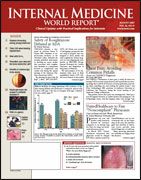Publication
Article
Internal Medicine World Report
Breast Cancer Screening Still Have Large Holes
Breast Cancer Screening Still Have Large Holes
By Rosemary Frei, MSc
A retrospective analysis has confirmed many breast cancer cases are not detected until they have reached advanced stages, and that economically disadvantaged women are at highest risk of a delayed diagnosis.
Data from 7 health care plans across the United States indicated that 52% of women with late-stage breast cancer had not had a mammogram within 1 to 3 years before their diagnosis, while another 40% did have mammograms in that period, but with negative findings (J Nat Cancer Inst. 2004;96:1518-1527). Women most likely to have late-stage cancer were elderly, unmarried, had no college education and/or earned less than $50,000/year.
“I don’t think the paper is a great surprise, but it hammers home the concept that mammography is terribly important,” said Michael Ewer, MD, professor of medicine, University of Texas, M.D. Anderson Cancer Center, Houston. “Clearly the test isn’t perfect, but the major message from this paper is we’ve got to get these people to have mammograms, because we can save a lot of women from suffering from late-stage cancer.”
Stephen Taplin, MD, MPH, senior scientist, National Cancer Institute, Bethesda, Md., and 16 colleagues from a consortium of health plans called the Cancer Research Network examined the records of 1347 women diagnosed between 1995 and 1999 with metastatic breast cancer with or without a tumor ≥3 cm in diameter. The investigators compared these records with those of 1347 matched controls diagnosed with early-stage breast cancer in the same period.
Of the women with late-stage cancer, 52% had never previously been screened, compared with 34.4% of the controls (P = .03). Late-stage women were also significantly less likely to have had their cancer detected if they had been screened previously—39.5% versus 56.9% (P = .03). Moreover, women aged ≥75 were 2.77 times less likely to have been previously screened compared with younger women, while those without a family history of breast cancer were 1.84 times less likely to have been screened before, and unmarried women were 1.78 times less likely to have previous screening. Women from neighbourhoods with lower levels of education also were much less likely to have been screened before.
“This study shows that one opportunity to further reduce poor outcomes is to reach those women who have not been screened recently and offer them that opportunity,” affirmed Dr Taplin.
